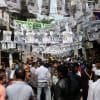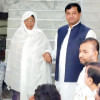#ChallengingTimes ahead for the Awami League?

When you think of a strong, organised political party, the first image that would come to mind is that of a rally with hundreds of thousands of supporters hoisting the party flags and chanting slogans at the top of their voices, wearing T-shirts and headbands containing the party emblem, and an influential leader speaking into a microphone on the stage. These political rallies take place more frequently ahead of a national-level election, because rallies are one of the best ways of cheering up the ranks of the party, especially the grassroots workers, in order to ensure a lively vote-seeking campaign. The more organised and enthused the grassroots workers are, the more powerful the party is.
However, a few months after elections, grassroots workers start to lose a bit of their importance. The party that wins the election reduces the number of rallies, obviously because they don't need them anymore, at least for a while, as they have won the polls. The party that loses also shuts itself down for a bit in order to deal with the defeat and let their grassroots workers recover from the loss. In Bangladesh, this cycle usually repeats every five years – the regulation interval between national elections.
The last 13 years, however, have been quite different. The Awami League has been in power throughout these years, and its main political opposition, the BNP, never quite managed to come out of their slumber after the massive defeat in the 2008 election. They tried a few things during this time, such as violent street protests and peaceful negotiations, but nothing really worked. At the same time, grassroots workers had a tough time on the ground, facing hundreds of political cases and police actions. Also, BNP's decision-makers focused more on getting back to power, rather than keeping its organisational base strong.

The ruling Awami League's grassroots workers, on the other hand, enjoyed a free run because of the opposition's organisational weaknesses. As a result, they indulged themselves in other matters (including money-making), because there was hardly anyone from the opposition to challenge them in the field. That is probably why Awami League General Secretary Obaidul Quader recently asked party leaders and workers to "save the party" by stopping "exchange of money for positions in local-level committees."
Make no mistake: elections in Bangladesh are still an expensive affair, despite there not being a truly competitive election in nearly a decade and a half (partly due to the opposition boycotting the polls). It's just that money is being spent by the ruling party leaders in other avenues instead of funding typical pre-election public relations campaigns. When there is no strong force in place to oppose you in the field, all you need to ensure is that you have the party nomination. And once you have that, you are almost as good as elected.
With just a little over a year to go before the next parliamentary election, why is Quader issuing a strict warning against the "money game"? Shouldn't he be saying encouraging things to his party members at this crucial time?
It appears as though allowing the practice of "buying" nominations for too long may have hurt the party's internal democracy. Now that their main political opposition has managed to rise from slumber, the ruling party is suddenly beginning to feel that they are not going to get a free run anymore, which they have been enjoying for nearly one and a half decades. It also means that if someone has the money, they can easily throw off the dedicated leaders at the upazila and union levels in the race for nominations. The fact that a staggering 62 percent of current parliament members are businessmen bears testimony. All of these may have created pockets of dissent among the leaders and workers, which the senior leadership of the ruling party is beginning to realise may prove to be counterproductive.
The influence of senior leaders depends to a large extent on the number of local-level leaders they have as followers. During door-to-door campaigns, senior leaders who run for parliamentary seats can only reach a limited number of voters. It is the field workers, controlled by the local-level leaders, who carry out the tedious work of making sure that they engage on a personal level with every voter. So, if there is growing frustration at that level, eventually the party's popularity is going to suffer, and it might be eventually reflected in election outcomes.
Mohammad Al-Masum Molla is deputy chief editor at The Daily Star.


 For all latest news, follow The Daily Star's Google News channel.
For all latest news, follow The Daily Star's Google News channel. 









Comments